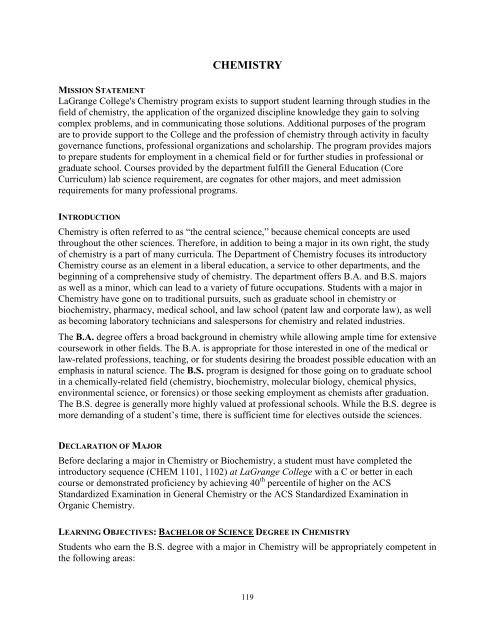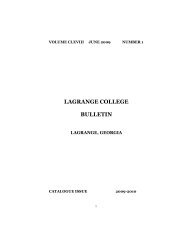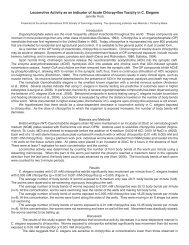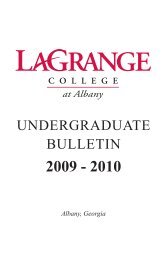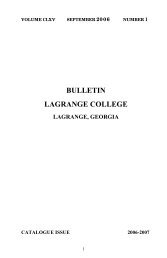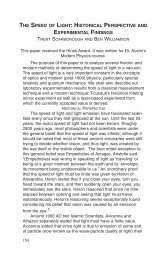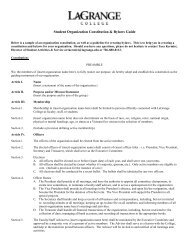undergraduate bulletin - LaGrange College
undergraduate bulletin - LaGrange College
undergraduate bulletin - LaGrange College
Create successful ePaper yourself
Turn your PDF publications into a flip-book with our unique Google optimized e-Paper software.
CHEMISTRY<br />
MISSION STATEMENT<br />
<strong>LaGrange</strong> <strong>College</strong>'s Chemistry program exists to support student learning through studies in the<br />
field of chemistry, the application of the organized discipline knowledge they gain to solving<br />
complex problems, and in communicating those solutions. Additional purposes of the program<br />
are to provide support to the <strong>College</strong> and the profession of chemistry through activity in faculty<br />
governance functions, professional organizations and scholarship. The program provides majors<br />
to prepare students for employment in a chemical field or for further studies in professional or<br />
graduate school. Courses provided by the department fulfill the General Education (Core<br />
Curriculum) lab science requirement, are cognates for other majors, and meet admission<br />
requirements for many professional programs.<br />
INTRODUCTION<br />
Chemistry is often referred to as ―the central science,‖ because chemical concepts are used<br />
throughout the other sciences. Therefore, in addition to being a major in its own right, the study<br />
of chemistry is a part of many curricula. The Department of Chemistry focuses its introductory<br />
Chemistry course as an element in a liberal education, a service to other departments, and the<br />
beginning of a comprehensive study of chemistry. The department offers B.A. and B.S. majors<br />
as well as a minor, which can lead to a variety of future occupations. Students with a major in<br />
Chemistry have gone on to traditional pursuits, such as graduate school in chemistry or<br />
biochemistry, pharmacy, medical school, and law school (patent law and corporate law), as well<br />
as becoming laboratory technicians and salespersons for chemistry and related industries.<br />
The B.A. degree offers a broad background in chemistry while allowing ample time for extensive<br />
coursework in other fields. The B.A. is appropriate for those interested in one of the medical or<br />
law-related professions, teaching, or for students desiring the broadest possible education with an<br />
emphasis in natural science. The B.S. program is designed for those going on to graduate school<br />
in a chemically-related field (chemistry, biochemistry, molecular biology, chemical physics,<br />
environmental science, or forensics) or those seeking employment as chemists after graduation.<br />
The B.S. degree is generally more highly valued at professional schools. While the B.S. degree is<br />
more demanding of a student‘s time, there is sufficient time for electives outside the sciences.<br />
DECLARATION OF MAJOR<br />
Before declaring a major in Chemistry or Biochemistry, a student must have completed the<br />
introductory sequence (CHEM 1101, 1102) at <strong>LaGrange</strong> <strong>College</strong> with a C or better in each<br />
course or demonstrated proficiency by achieving 40 th percentile of higher on the ACS<br />
Standardized Examination in General Chemistry or the ACS Standardized Examination in<br />
Organic Chemistry.<br />
LEARNING OBJECTIVES: BACHELOR OF SCIENCE DEGREE IN CHEMISTRY<br />
Students who earn the B.S. degree with a major in Chemistry will be appropriately competent in<br />
the following areas:<br />
119


